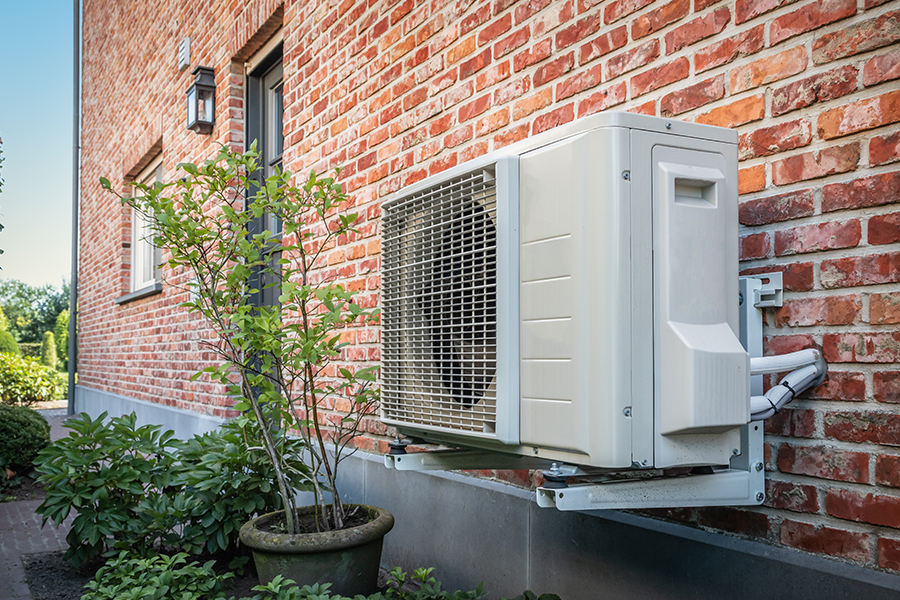
18 Oct Is a Heat Pump system right for your home?
The recent government announcement regarding the Net Zero plan revisions has shone a spotlight on the increase in the Boiler Upgrade Grant. Homeowners can now receive £7,500 when they replace their boiler with a heat pump. Although government plans can change, the emphasis on heat pumps being the future of home heating remains strong.
If you’re thinking of moving, renting or buying, and want some home inspiration take some time to browse our properties available in Virginia Water and the surrounding areas. If you have any questions, you can also visit our award-winning website or call us on 01344 843000 and email us.
In this blog post, we’ll take a closer look at heat pumps and provide you with essential insights you need to know about this innovative heating technology and help you to understand whether it’s right for your home.
Heat Pumps vs Boilers
The choice between a heat pump and a boiler comes down to their fundamental differences in operation:
Heat Pump
Heat pumps use electricity as their primary energy source. They don’t burn fuel; instead, they transfer heat from the outside environment, even in colder temperatures, into your home. They are well-suited for well-insulated homes and provide more gradual and consistent heating. Heat pumps are also capable of cooling spaces.
Boiler
Boilers typically use natural gas, oil, or electricity to produce heat. They burn fuel or use electrical resistance to generate warmth, and they operate by heating water or a heat transfer fluid. Boilers are known for their ability to provide rapid and high-temperature heat, making them suitable for older, less insulated buildings.
What is the Boiler Upgrade Grant?
The government has taken significant steps to promote the adoption of heat pumps and environmentally-friendly heating systems. The Boiler Upgrade Grant has been increased from £5,000 to £7,500. This financial support is part of the government’s commitment to reaching “net zero” greenhouse gas emissions by 2050. It aims to make eco-friendly heating solutions more accessible to homeowners in England and Wales.
Grants are available for various heating systems, including air source heat pumps, ground source heat pumps, water source heat pumps, and biomass boilers for those residing in rural areas. However, even with the increased grant amount, it may not cover the full installation cost.
Eligibility for this scheme requires an eligible Energy Performance Certificate (EPC) for the property, issued within the last 10 years, with no outstanding recommendations for loft or cavity wall insulation. If insulation is recommended, it must be addressed either before or as part of the application process.
The scheme does not apply to social housing or new-build properties. Private rented accommodation is eligible, but the landlord must initiate the application.
How is the scheme changing?
The government has recognised the importance of green heating and extended the scheme until 2028. This extension comes after concerns were raised about the scheme’s low take-up, jeopardising national green heating targets. Prime Minister Rishi Sunak reaffirmed the 2035 ban on new gas boilers and the grant increase. Additionally, an exemption is being introduced to aid households facing particular difficulties in switching to eco-friendly heating, potentially applying to about a fifth of homes.
Furthermore, the government has decided to postpone the ban on installing oil and liquid-petroleum-gas (LPG) boilers and new coal heating in off-gas-grid homes until 2035. This delay is intended to provide these households with more time to adapt to the changes.
How do heat pumps work?
Heat pumps are electrically-powered devices that absorb heat from the air, ground, or water in the surrounding environment. For example, air-source heat pumps extract heat from outdoor air and transfer it into the building. These pumps are often compact units installed outside the property.
Heat pumps come in various types and sizes, depending on the property’s needs. They are known for their energy efficiency, being typically three times more efficient than gas boilers. However, the cost-effectiveness depends on electricity prices, as electricity can be more expensive than gas.
Are Heat Pumps suitable for every home?
Heat pumps may not be suitable for older homes with poor insulation, properties with limited outdoor space, homes with existing high-efficiency gas systems, or properties in areas with an unreliable electricity supply. It’s crucial to seek unbiased expert advice before deciding on the most suitable heating solution for your specific circumstances.
What’s the right choice for you?
Determining whether it’s the right time to install a heat pump or opt for a new boiler depends on your property and budget. If you’re considering selling your property, it’s a good idea to start with a free Property Valuation, you can fill in the form online or contact us today and our expert team will provide you with your free market appraisal.
GET IN TOUCH
If you are thinking of moving in or out of the area, make sure you take a look at our amazing catalogue of properties for sale in Virginia Water and the surrounding areas. If you’d like to speak to someone about properties to let in Virginia Water, a member of our expert team would be happy to help. You can call us on 01344 843000 or email us. You can also follow us on Facebook, Twitter, Instagram, and LinkedIn.
